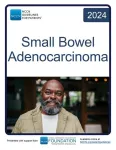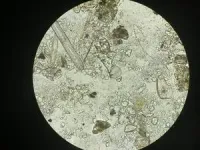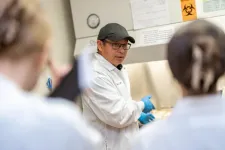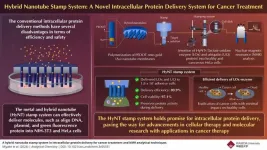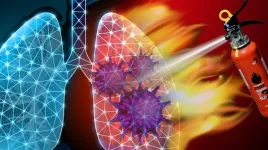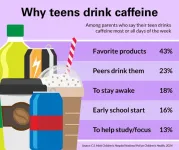(Press-News.org) PLYMOUTH MEETING, PA [May 20, 2024] — The National Comprehensive Cancer Network® (NCCN®) today announced publication of new NCCN Guidelines for Patients®: Small Bowel Adenocarcinoma. This free resource for people facing cancer and caregivers is focused on a rare cancer type that typically occurs in the small intestine, where routine screening is impossible, even for high-risk individuals. The small amount of patient information that exists for this cancer type tends to combine it with other cancers of the small intestine (such as sarcomas, neuroendocrine tumors, or lymphomas) despite very different treatment approaches and results.
The NCCN Guidelines for Patients: Small Bowel Adenocarcinoma are now available for free download at NCCN.org/patientguidelines, thanks to funding from the NCCN Foundation®.
“People with rare diseases like small bowel cancer often have a difficult time finding trustworthy and thorough information about what they are going through,” said Michael Sapienza, CEO, Colorectal Cancer Alliance. “We appreciate NCCN’s commitment to sharing explanations of the latest evidence and expert consensus for common colon and rectal cancers and also for rarer cancers, like those involving the small intestine. This new guidance helps people with small bowel adenocarcinoma understand current treatment standards and know what questions to ask their doctor in order to make more informed decisions about their care.”
The NCCN Guidelines for Patients are based on the gold standard NCCN Clinical Practice Guidelines in Oncology (NCCN Guidelines®) used by health care providers worldwide to determine the best cancer treatment options for the best results. The patient versions offer the same evidence-based expert consensus recommendations in lay terms. including a helpful glossary, illustrations, and suggested questions to ask. They have won numerous awards for empowering people with cancer and their caregivers and are highly ranked for trustworthiness, according to independent studies.
“I’m excited to have information out there for the patients that has been vetted by subject matter experts. There’s not much for people with this disease, and everything helps,” said Katrina Pedersen, MD, MS, Mayo Clinic Comprehensive Cancer Center (previously with Siteman Cancer Center at Barnes-Jewish Hospital and Washington University School of Medicine), a Member of the NCCN Guidelines® Panel for Colon/Rectal/Anal Cancers and Small Intestine Adenocarcinoma, who played a key role in advocating for the creation of the clinical guidelines for small bowel adenocarcinoma. “I appreciate NCCN’s commitment to filling knowledge gaps in the rare disease space. I also hope these guidelines will help to raise awareness about small bowel adenocarcinoma and how much more we hope to learn about it in the future.”
Among the things that are known:
Treatment differs from that for colon or rectal cancer in several ways, with the role of immunotherapy highlighted for patients with specific genomic profiles.
For local (stage I–III) disease, the primary treatment involves surgery, including removal of nearby lymph nodes.
Most metastatic patients are treated with systemic therapy.
Small bowel adenocarcinoma is more common in people with Lynch syndrome or inflammatory bowel disease.
“Patients may not be aware that they could have a hereditary risk,” explained Al B. Benson, III, MD, Robert H. Lurie Comprehensive Cancer Center of Northwestern University, Chair of the NCCN Guidelines Panel for Colon/Rectal/Anal Cancers and Small Intestine Adenocarcinoma and Member of the NCCN Foundation Board of Directors. “That is important not only for the individual who has the disease, but it can also impact their relatives and offspring. If someone with small bowel adenocarcinoma has been demonstrated to have inherited risk, we want to make sure family members get genetic counseling and testing to see if they carry the same risk.”
NCCN Guidelines for Patients already exist for some of the other cancer types that are found in the intestines, including colon and rectal cancers, neuroendocrine tumors, and gastrointestinal stromal tumors (GIST). There are also prevention and supportive care guides covering topics like colorectal cancer screening and immunotherapy side effects.
Visit NCCN.org/patientresources to learn more about all of the different ways that NCCN and the NCCN Foundation help to inform and empower people facing cancer and their caregivers.
# # #
About the National Comprehensive Cancer Network
The National Comprehensive Cancer Network® (NCCN®) is a not-for-profit alliance of leading cancer centers devoted to patient care, research, and education. NCCN is dedicated to improving and facilitating quality, effective, equitable, and accessible cancer care so all patients can live better lives. The NCCN Clinical Practice Guidelines in Oncology (NCCN Guidelines®) provide transparent, evidence-based, expert consensus recommendations for cancer treatment, prevention, and supportive services; they are the recognized standard for clinical direction and policy in cancer management and the most thorough and frequently-updated clinical practice guidelines available in any area of medicine. The NCCN Guidelines for Patients® provide expert cancer treatment information to inform and empower patients and caregivers, through support from the NCCN Foundation®. NCCN also advances continuing education, global initiatives, policy, and research collaboration and publication in oncology. Visit NCCN.org for more information.
About the NCCN Foundation
The NCCN Foundation empowers people with cancer and their caregivers by delivering unbiased expert guidance from the world’s leading cancer experts through the library of NCCN Guidelines for Patients® and other patient education resources. The NCCN Foundation is also committed to advancing cancer treatment by funding the nation’s promising young investigators at the forefront of cancer research. For more information about the NCCN Foundation, visit nccnfoundation.org.
END
Groundbreaking research has provided new insight into the tectonic plate shifts that create some of the Earth’s largest earthquakes and tsunamis.
“This is the first study to employ coastal geology to reconstruct the rupture history of the splay fault system,” said Jessica DePaolis, postdoctoral fellow in Virginia Tech's Department of Geosciences. “These splay faults are closer to the coast, so these tsunamis will be faster to hit the coastline than a tsunami generated only from ...
In 2023, Antarctic sea ice reached historically low levels, with over 2 million square kilometres less ice than usual during winter – equivalent to about ten times the size of the UK. This drastic reduction followed decades of steady growth in sea ice up to 2015, making the sudden decline even more surprising.
Using a large climate dataset called CMIP6, BAS researchers investigated this unprecedented sea ice loss. They analysed data from 18 different climate models to understand the probability of such a significant reduction in sea ice and its connection to climate change.
Lead author Rachel Diamond explained that while 2023's extreme ...
For hundreds of years, the whitespotted eagle ray (Aetobatus narinari) has been considered the only inshore stingray species in Bermuda, until now.
Using citizen science, photographs, on-water observations and the combination of morphological and genetic data, researchers from Florida Atlantic University’s Harbor Branch Oceanographic Institute and collaborators are the first to provide evidence that the Atlantic cownose ray (Rhinoptera bonasus) has recently made a new home in Bermuda.
Because ...
For many patients with a deadly type of brain cancer called glioblastoma, chemotherapy resistance is a big problem.
Current standard treatments, including surgery, radiation, and chemotherapy using the drug temozolomide, have limited effectiveness and have not significantly changed in the past five decades. Although temozolomide can initially slow tumor progression in some patients, typically the tumor cells rapidly become resistant to the drug.
But now, Virginia Tech researchers with the Fralin Biomedical Research Institute at VTC may ...
In today's medical landscape, precision medicine and targeted therapies are gaining traction for their ability to tailor treatments to individual patients while minimizing adverse effects. Conventional methods, such as gene transfer techniques, show promise in delivering therapeutic genes directly to cells to address various diseases. However, these methods face significant drawbacks, hindering their efficacy and safety.
Intracellular protein delivery offers a promising approach for developing safer, more targeted, and effective therapies. By directly transferring proteins into target cells, this method circumvents issues such as silencing ...
HOUSTON – (May 20, 2024) – Rice University chemist Julian West is one of a dozen up-and-coming young scientists featured in Chemical & Engineering News’ (C&EN) 2024 Talented 12, an annual issue of the weekly news magazine that highlights rising stars across all chemistry research disciplines.
West, an assistant professor and the Norman Hackerman-Welch Young Investigator in Rice’s Department of Chemistry, is a synthetic chemist whose lab designs novel chemical reactions. Drawing inspiration from biology, West’s research group has found ways to simplify the production of entire libraries of feedstock chemicals ...
VANCOUVER, Wash. – Using more robots to close labor gaps in the hospitality industry may backfire and cause more human workers to quit, according to a Washington State University study.
The study, involving more than 620 lodging and food service employees, found that “robot-phobia” – specifically the fear that robots and technology will take human jobs – increased workers’ job insecurity and stress, leading to greater intentions to leave their jobs. The impact was more pronounced with employees who had ...
In some severe cases of COVID-19, the lungs undergo extreme damage, resulting in a range of life-threatening conditions like pneumonia, inflammation, and acute respiratory distress syndrome. The root cause of those wide-ranging reactions in the lungs has until now remained unclear.
A new study by researchers at Columbia and the Columbia University Irving Medical Center sheds light on this mystery. The study found that ferroptosis, a form of cell death first named and identified at Columbia in 2012, is the major cell death mechanism that underlies COVID-19 lung disease. The finding indicates that deliberately halting ...
Researchers at Karolinska Institutet in Sweden have succeeded in delivering targeted cancer treatment via small membrane bubbles that our cells use to communicate. A new study published in Nature Biomedical Engineering shows that the treatment reduces tumour growth and improves survival in mice.
When our cells communicate, they send out small membrane bubbles known as extracellular vesicles which contain various signalling molecules. Interest in these tiny bubbles, sometimes referred to as the body’s ...
ANN ARBOR, Mich. – A quarter of parents report that caffeine is basically part of their teen’s daily life, according to a national poll.
Two in three parents think they know whether their teen’s caffeine intake is appropriate and which products have too much caffeine. Yet a third aren’t able to identify recommended caffeine limits, according to the University of Michigan Health C.S. Mott Children’s Hospital National Poll on Children’s Health.
“Our report suggests parents may not always be aware of how much they should be limiting caffeine consumption for teens,” said poll co-director and Mott ...
